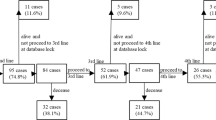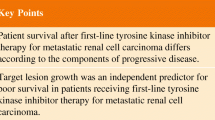Abstract
Background
To evaluate the association between the timing of best tumor shrinkage (bTS) and metastatic renal cell carcinoma (mRCC) patient survival after first-line tyrosine kinase inhibitor (TKI) therapy.
Methods
The tumors of 91 patients with mRCC showed a response to TKIs. None of the patients had received prior cytokine therapy. The magnitude of bTS was categorized according to the Response Evaluation Criteria in Solid Tumors v. 1.1. The patients were divided into two subgroups according to the timing of bTS: early responders (≤3 months) and late responders (>3 months). Overall survival (OS) and progression-free survival (PFS) after first-line TKI therapy were evaluated, and factors predicting survival were examined.
Results
Sunitinib, sorafenib, and pazopanib were used in 62, 25, and 4 responders, respectively. In total, 52 (57.1 %) and 39 (42.9 %) patients were early and late responders, respectively. Early responders had significantly lower PFS compared to late responders (median survival, 11.4 vs. 19.1 months; log-rank test, p = 0.0263), although there were no significant differences in the OS of early and late responders (27.0 vs. 30.1 months, p = 0.306). Multivariate analyses revealed that the timing of bTS was an independent predictor of PFS and OS (PFS, hazard ratio 4.09, p < 0.0001; OS, hazard ratio 2.32, p = 0.0107).
Conclusion
The timing of bTS was an independent predictor of survival in patients with mRCC who received first-line TKIs.





Similar content being viewed by others
Abbreviations
- bTS:
-
Best tumor shrinkage
- mRCC:
-
Metastatic renal cell carcinoma
- TKI:
-
Tyrosine kinase inhibitor
- OS:
-
Overall survival
- PFS:
-
Progression-free survival
- RECIST:
-
The standard response evaluation criteria in solid tumors
- AE:
-
Adverse events
- HR:
-
Hazard ratios
- CI:
-
Confidence intervals
- MSKCC:
-
Memorial Sloan Kettering Cancer Center
References
Figlin R, Sternberg C, Wood CG (2012) Novel agents and approaches for advanced renal cell carcinoma. J Urol 188:707–715
Motzer RJ, Hutson TE, Tomczak P et al (2007) Sunitinib versus interferon alfa in metastatic renal-cell carcinoma. N Engl J Med 356:115–124
Motzer RJ, Hutson TE, Cella D et al (2013) Pazopanib versus sunitinib in metastatic renal-cell carcinoma. N Engl J Med 369:722–731
Escudier B, Eisen T, Stadler WM et al (2007) Sorafenib in advanced clear-cell renal-cell carcinoma. N Engl J Med 356:125–134
Eisenhauer EA, Therasse P, Bogaerts J et al (2009) New response evaluation criteria in solid tumours: revised RECIST guideline (version 1.1). Eur J Cancer (Oxf) 1990;45:228–247
Busch J, Seidel C, Goranova I et al (2014) Categories of response to first line vascular endothelial growth factor receptor targeted therapy and overall survival in patients with metastatic renal cell carcinoma. Eur J Cancer (Oxf) 1990;50:563–569
Grunwald V, McKay RR, Krajewski KM et al (2015) Depth of remission is a prognostic factor for survival in patients with metastatic renal cell carcinoma. Eur Urol 67:952–958
Seidel C, Busch J, Weikert S et al (2013) Tumour shrinkage measured with first treatment evaluation under VEGF-targeted therapy as prognostic marker in metastatic renal cell carcinoma (mRCC). Br J Cancer 109:2998–3004
Miyake H, Miyazaki A, Imai S et al (2016) Early tumor shrinkage under treatment with first-line tyrosine kinase inhibitors as a predictor of overall survival in patients with metastatic renal cell carcinoma: a retrospective multi-institutional study in Japan. Target Oncol 11:175–182
Molina AM, Lin X, Korytowsky B et al (2014) Sunitinib objective response in metastatic renal cell carcinoma: analysis of 1059 patients treated on clinical trials. Eur J Cancer (Oxf) 1990;50:351–358
Ljungberg B, Cowan NC, Hanbury DC et al (2010) EAU guidelines on renal cell carcinoma: the 2010 update. Eur Urol 58:398–406
Ljungberg B, Bensalah K, Canfield S et al (2015) EAU guidelines on renal cell carcinoma: 2014 update. Eur Urol 67:913–924
Kondo T, Takagi T, Kobayashi H et al (2014) Superior tolerability of altered dosing schedule of sunitinib with 2-weeks-on and 1-week-off in patients with metastatic renal cell carcinoma–comparison to standard dosing schedule of 4-weeks-on and 2-weeks-off. Jpn J Clin Oncol 44:270–277
Ishihara H, Kondo T, Omae K et al (2016) The magnitude of best tumor shrinkage during second-line targeted therapy affects progression-free survival but not overall survival in patients with metastatic renal cell carcinoma. Jpn J Clin Oncol 46:568–574
Heng DY, Wells JC, Rini BI et al (2014) Cytoreductive nephrectomy in patients with synchronous metastases from renal cell carcinoma: results from the International Metastatic Renal Cell Carcinoma Database Consortium. Eur Urol 66:704–710
Conti SL, Thomas IC, Hagedorn JC et al (2014) Utilization of cytoreductive nephrectomy and patient survival in the targeted therapy era. Int J Cancer 134:2245–2252
Motzer RJ, Mazumdar M, Bacik J et al (1999) Survival and prognostic stratification of 670 patients with advanced renal cell carcinoma. J Clin Oncol 17:2530–2540
Zhang HL, Qin XJ, Wang HK et al (2015) Clinicopathological and prognostic factors for long-term survival in Chinese patients with metastatic renal cell carcinoma treated with sorafenib: a single-center retrospective study. Oncotarget 6:36870–36883
Iacovelli R, Lanoy E, Albiges L et al (2012) Tumour burden is an independent prognostic factor in metastatic renal cell carcinoma. BJU Int 110:1747–1753
Acknowledgments
We thank Editage (www.editage.jp) for English language editing.
Author information
Authors and Affiliations
Corresponding author
Ethics declarations
Conflict of interest
The authors have no conflicts of interest to disclose.
About this article
Cite this article
Ishihara, H., Yagisawa, T., Kondo, T. et al. Effect of the timing of best tumor shrinkage on survival of patients with metastatic renal cell carcinoma who received first-line tyrosine kinase inhibitor therapy. Int J Clin Oncol 22, 126–135 (2017). https://doi.org/10.1007/s10147-016-1032-7
Received:
Accepted:
Published:
Issue Date:
DOI: https://doi.org/10.1007/s10147-016-1032-7




